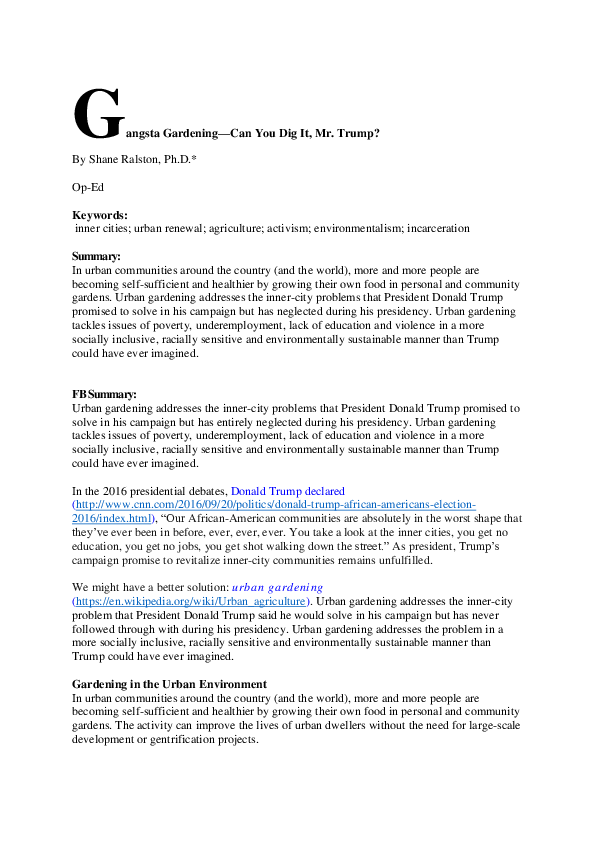Academia.edu no longer supports Internet Explorer.
To browse Academia.edu and the wider internet faster and more securely, please take a few seconds to upgrade your browser.
Gangsta Gardening—Can You Dig It, Mr. Trump?
Gangsta Gardening—Can You Dig It, Mr. Trump?
In urban communities around the country (and the world), more and more people are becoming self-sufficient and healthier by growing their own food in personal and community gardens. Urban gardening addresses the inner city problems that Donald Trump promised to solve during his campaign but has neglected to deliver during his presidency, and it does so in a more socially inclusive, racially sensitive and environmentally sustainable way.
Related Papers
2015 •
The early history of urban gardens in the United States of America is one of food production in response to war, economic depression, and short-lived civic reform movements. During the past thirty years, a broad-based community garden movement has spawned a wide variety of social, economic, health, and educational benefits in more than 250 cities and towns across the country. A companion food security movement has promoted urban-rural linkages, urban agriculture, and farmers' markets. Studies have shown that community gardens and nearby green space in cities are an important response to needs for nutritious and affordable food, psychological and physiological health, social cohesion, crime prevention, recreation, and life satisfaction, particularly in low-income communities.
SAGE Handbook of Resistance
Urban Gardening: Between Green Resistance and Ideological Instrument2016 •
Environmental Design Research Association, Proceedings of the 50th conference
Thinking about the future of cities: practices and impacts of collective gardens2019 •
Landscape and Urban Planning
Guerrilla gardening and green activism: Rethinking the informal urban growing movement2017 •
Cities and the environment
Community Gardens: An Exploration of Urban Agriculture in the Bronx, New York City2010 •
European journal of American studies
What Can Urban Gardening Really Do About Gentrification? A Case-Study of Three San Francisco Community Gardens2015 •
The basic question guiding this article is what do people living in an underserved neighborhood in St. Louis, Missouri, think about the urban gardens that have sprouted up around them during the last ten years. The question arose because of the mixed success of a produce market that was meant to target the nutritional needs of this African American community. Based on interviews conducted at two garden sites created by the nonprofit HopeBUILD, the author found that the community members valued the gardens less for the nutrition they offered than for the values and sense of heritage they conveyed. The ways they spoke about the gardens and produce resonated with old agrarian myths about the cultural importance of working the land to build a strong sense of character and independence. Many have relatives who took part in the Great Migration from the rural South in the early twentieth century. Although African Americans suffered devastating hardships from corrupt and racist tenant and farm policies, many held fast to the agrarian myth that to own a farm, or produce one's own food, enabled self-determination and full rights of citizenship. These inner-city African Americans, therefore, stake claim to one of the longest-lasting and most potent symbols of American national identity—the American farmer. The symbol of the farmer is as relevant in urban lots as it is in the countryside. The point is that healthy food and nutritious food are not necessarily the same thing. Healthy foods are ones that sustain cultures, not just bodies.
Purdue Journal of Service Learning and International Engagement
Growing Local: The Role of Urban Gardening in Fostering Food Security, Sustainability, and CommunityRELATED PAPERS
University of Thi-Qar Journal of Science
استخلاص الزيوت الاساسية من نبات الرشاد البري(Lepidium aucheri boiss) و دراسة فعاليتها الحيوية2019 •
EPRA international journal of economics, business and management
A Study on Investors’ Awareness Towards Post-Office Savings Scheme2022 •
2022 •
The European Physical Journal B - Condensed Matter
Exploring valleys of aging systems: the spin glass case2003 •
Bulletin of Portuguese/Japanese Studies
The Grand Inquisitor Inoue Chikugo no Kami Masashige, spin doctor of the Tokugawa bakufu2003 •
Aggressive Behavior
Elevation and reduction of plasma tryptophan and their effects on aggression and perceptual sensitivity in normal males1986 •
2015 •
International Journal of Research -GRANTHAALAYAH
Awareness, Attitude and Practice Towards Halitosis- a Case Study at Collage of Health Science and Technology Jahun, Jigawa State Nigeria2018 •
In Vitro Cellular & Developmental Biology - Animal
THE ISOLATION OF AN IMMORTALIZED AND TUMORIGENIC CELL LINE FROM p21WAF1 NULL MOUSE BLADDERS2002 •


 Shane J Ralston
Shane J Ralston